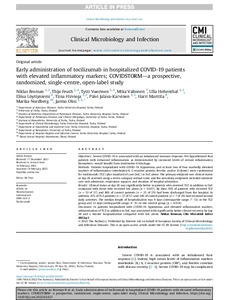Early administration of tocilizumab in hospitalized COVID-19 patients with elevated inflammatory markers; COVIDSTORM—a prospective, randomized, single-centre, open-label study
Broman Niklas; Feuth Matthijs; Vuorinen Tytti; Valtonen Mika; Hohenthal Ulla; Löyttyniemi Eliisa; Hirvioja Tiina; Jalava-Karvinen Päivi; Marttila Harri; Nordberg Marika; Oksi Jarmo
https://urn.fi/URN:NBN:fi-fe2022081154940
Tiivistelmä
Objectives
Severe COVID-19 is associated with an imbalanced immune response. We hypothesized that patients with enhanced inflammation, as demonstrated by increased levels of certain inflammatory biomarkers, would benefit from interleukin-6 blockage.
Methods
Patients hospitalized with COVID-19, hypoxemia, and at least two of four markedly elevated markers of inflammation (interleukin-6, C-reactive protein, ferritin, and/or D-dimer) were randomized for tocilizumab (TCZ) plus standard of care (SoC) or SoC alone. The primary endpoint was clinical status at day 28 assessed using a seven-category ordinal scale, and the secondary endpoints included intensive care unit admission, respiratory support, and duration of hospital admission.
Results
Clinical status at day 28 was significantly better in patients who received TCZ in addition to SoC compared with those who received SoC alone (p = 0.037). By then, 93% of patients who received TCZ (n = 53 of 57) and 86% of control patients (n = 25 of 29) had been discharged from the hospital. In addition, 47% of TCZ patients (n = 27 of 57) and 24% of control patients (n = 7 of 29) had resumed normal daily activities. The median length of hospitalization was 9 days (interquartile range, 7–12) in the TCZ group and 12 days (interquartile range, 9–15) in the control group (p = 0.014).
Discussion
In patients hospitalized with COVID-19, hypoxemia, and elevated inflammation markers, administration of TCZ in addition to SoC was associated with significantly better clinical recovery by day 28 and a shorter hospitalization compared with SoC alone.
Kokoelmat
- Rinnakkaistallenteet [29335]
